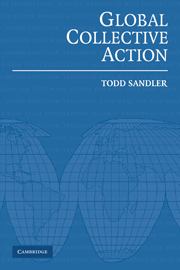Book contents
- Frontmatter
- Contents
- Tables and Figures
- Preface
- 1 Future Perfect
- 2 “With a Little Help from My Friends”: Principles of Collective Action
- 3 Absence of Invisibility: Market Failures
- 4 Transnational Public Goods: Financing and Institutions
- 5 Global Health
- 6 What to Try Next? Foreign Aid Quagmire
- 7 Rogues and Bandits: Who Bells the Cat?
- 8 Terrorism: 9/11 and Its Aftermath
- 9 Citizen against Citizen
- 10 Tales of Two Collectives: Atmospheric Pollution
- 11 The Final Frontier
- 12 Future Conditional
- References
- Author Index
- Subject Index
Preface
Published online by Cambridge University Press: 19 January 2010
- Frontmatter
- Contents
- Tables and Figures
- Preface
- 1 Future Perfect
- 2 “With a Little Help from My Friends”: Principles of Collective Action
- 3 Absence of Invisibility: Market Failures
- 4 Transnational Public Goods: Financing and Institutions
- 5 Global Health
- 6 What to Try Next? Foreign Aid Quagmire
- 7 Rogues and Bandits: Who Bells the Cat?
- 8 Terrorism: 9/11 and Its Aftermath
- 9 Citizen against Citizen
- 10 Tales of Two Collectives: Atmospheric Pollution
- 11 The Final Frontier
- 12 Future Conditional
- References
- Author Index
- Subject Index
Summary
Globalization has increased cross-border flows beyond trade in goods and financial exchanges. Borders are porous to pollutants, diseases, terrorism, knowledge, political upheavals, conflicts, and computer viruses and worms. Unlike the nation–state where citizens can turn to a central authority to address such problems within its borders, the global community exists in a more anarchic state with independent actors who cherish their autonomy. Although these cross-border flows will continue to expand, driven by the dual forces of market globalization and technological progress, there is no movement toward global governance. Hence, one must look to nation-states, nongovernmental organizations (NGOs), multinationals, charitable foundations, and multilateral organizations as the key actors to address problems requiring coordinated efforts of two or more entities – that is, collective action.
Even in the absence of a governing body, the global community has achieved some notable successes in curbing ozone shield depletion, instituting standards of financial practices, eradicating smallpox, and regulating transit on open seas. In other areas such as the control of greenhouse gases or the elimination of transnational terrorism, the story is much different, as nations have failed thus far to coordinate their actions sufficiently. So, the real question is, what factors promote or inhibit successful collective action at the regional or global level to address an ever-growing set of challenges? This book answers this question by identifying the basic elements that affect global collective action. To do so, I rely on the modern principles of collective action and the application of some elementary game theory. The latter is necessary because collective action involves strategic interactions where choices and their consequences are dependent on one's own actions and those of others.
- Type
- Chapter
- Information
- Global Collective Action , pp. xi - xivPublisher: Cambridge University PressPrint publication year: 2004



